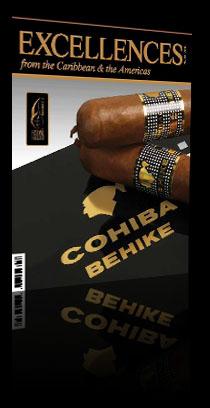Habanos Tequila. Alliance
The association of two Protected Guarantees of Origin that stand for the highest expression of quality and tradition in both Mexico and Cuba –conceived in an effort to beef up the ties between the two items in the international markets during the course of the 12th Habano Festival– opens a new window of approach and joint endeavors between the two entities, this time around featuring a top-class premiere with a match-style tasting session of habanos and some of the world’s finest tequilas in the Aged and Extra Aged categories.
Within the framework of this development, Excelencias contacted with Ana Paula Ramirez, with the International Affairs Division of the Tequila Regulatory Council, who said “this alliance is very important because both products hold Guarantees of Origin, are unique and widely recognized all around the world for their undisputed quality.” In this sense, Mrs. Ramirez pointed out that “the invitation made by Habanos, S.A. for the alliance between these two Guarantees of Origin is a major step forward in the promotion of a fusion between the characteristic tastes these two products have to offer, and it’s done within the framework of a celebration where matchings that will seal a relationship of much anticipated harmony will be conducted.
The Tequila Regulatory Council The Tequila Regulatory Council was founded on May, 17, 1994 thanks to a group of visionaries from the realm of the agave-tequila production that managed to gather in this institution all major stakeholders in the company, all ruled under the Federal Act of Metrology and Standardization that had been enacted in July 1992. At the same time, this is a certification, verification and testing body supported by the Mexican Accreditation Entity and recognized by the General Standard Division for evaluation in line with Mexico’s Official Standard for tequila (NOM-006-SCFI-2005 Alcoholic Beverages -Tequila-Specifications. The Tequila Regulatory Council is a non-profitable institution with representations in Brussels, Madrid, Washington and Shanghai. Its primary objective is to guarantee the authenticity of tequila to consumers throughout the entire process, from the farming of agave croplands to the bottling and sale of the traditional Mexican spirit.
Habanos Protected Guarantee of Origin Habanos is the internationally recognized Protected Guarantee of Origin reserved to label cigars heavier than 3 grams, traditionally designated under that name and made in Cuba, completely hand-rolled and in keeping with quality standards established by Cuba’s tobacco industry, using for their making varieties of black tobacco from the island, harvested in specific regions of the country and equally protected as guarantees of origin. The term habano has been used since the late 19th century to identify the world’s best cigars, even though Cuban tobacco had been considered the finest in the globe since the 18th century. It wasn’t until 1967, following the 1958 Lisbon Treaty for the international protection of guarantees of origin, that habanos and other tobacco guarantees of origin in Cuba were registered on the list of protect guarantees of origin. The new Habano Regulatory Council –it held its first meeting in January– is designed to enforce respect and guarantee the improvement of all procedures conducted in Cuba from the agricultural process to the end result at the factories, a process that has made this cigar the finest on the face of the earth. It’ made up of a president, a director general, a secretary and representatives from the National Association of Petit Farmers, the Tobacco Storage & Improvement and the Hand-Rolled Cigars enterprises, plus three representatives from Habanos, S.A. Corporation as the only entity in charge of the sale and marketing of Cuban tobacco products all around the world. The membership also includes a lawyer who acts as secretary.
Hailing from Mexico, tequila is named after a name-like city in the state of Jalisco. For tequila to be authentic, the beverage must be made in this country and it must contain at least 51 percent of agave, though the purest tequilas are 100 percent agave. Its name is an internationally recognized guarantee of origin that designates the agave liquor made in the proximities of Tequila, Amatitan, other municipalities of Jalisco, and in Guanajuato, Michoacan, Tamaulipas and Nayarit. The production process for this beverage consists of five basic stages: the harvesting of Agave tequilaza weber, a blue variety in the field, the cooking of the mescal –the kernel of the plant– the grinding, the fermentation and the distillation.























































































































